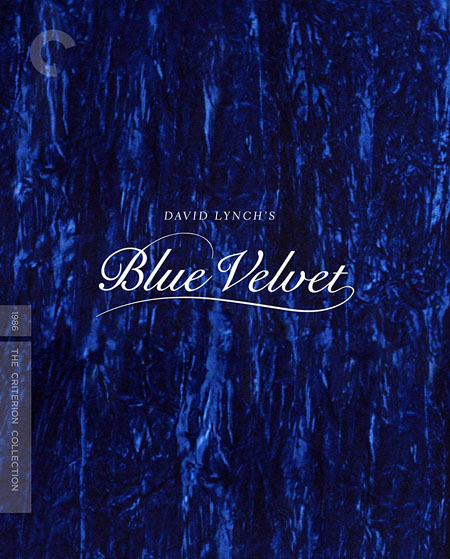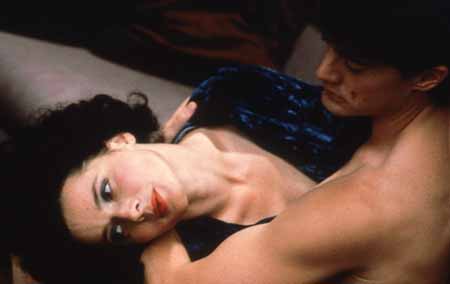
“DON’T LOOK AT ME!â€
By Raymond Benson
“Don’t
look at me!†shouts Frank Booth, the sociopath played by Dennis Hopper, but
that, of course, is exactly what David Lynch wants you to do.
Lynch
was nominated for a Best Director Oscar for this singular, extraordinary film
that shook audiences around the world in 1986, and it’s the picture that
solidified the filmmaker as perhaps the heir to the surrealists of the 1920s.
It’s a polarizing film that makes audiences uncomfortable and sometimes
outraged, and yet it possesses signature stylistic and thematic aspects to
which Lynch has returned many times in such fare as the more mainstream (but
also surreal) television series Twin
Peaks, and the dreamlike fugues of pictures like Lost Highway and Mulholland
Drive.
After
the box-office and critical failure of the sci-fi extravaganza, Dune (1984), Lynch exercised his option
with producer Dino De Laurentiis to make a smaller, personal movie of his
choice (with a drastically reduced budget). It is a work of striking brilliance
and power, despite the negative reactions from some viewers (including Roger
Ebert) to the violence against women depicted in the story. But this is what
the movie is about, and it is handled with frank and often shocking, but
artfully drawn, imagery in a film noir framework.
Lynch’s recurring themes of lost innocence, exploring the dark underbelly of a
seemingly all-American small town, voyeurism, good versus evil, and the
“mysteries of love†are on full display.
Jeffrey
(Kyle MacLachlan) is a college student who has come home to visit his
hospitalized father in his small town of Lumberton, North Carolina. While
walking through a field, he finds a severed human ear. He dutifully brings it
to the police station, and then becomes friendly with the detective’s daughter,
Sandy (Laura Dern). While on a date, Sandy tells him that she overheard her
father discussing the case, and it involves a lounge singer named Dorothy
Vallens (Isabella Rossellini). Jeffrey takes it upon himself to play detective
on his own and break into Dorothy’s apartment. Suddenly, Jeffrey’s safe little
world is turned upside down and he is sucked into a cabal of sadistic criminals
led by Frank Booth (Hopper, in a truly scary, nightmare-inducing performance).
Dean Stockwell, Brad Dourif, and Jack Nance are among the gang members, and
each of them are as eccentric and creepy as their boss.
It’s
a tale of a Boy Scout who discovers hard truths
about the world we live in, and of a woman who sacrifices her soul for the
safety of her husband and son. At its heart it is a profound statement on love
and what we as humans are willing to do, not for it, but because of
it. Blue Velvet is an uncompromising
work of art that will stand the test of time, the quintessential David Lynch
film, the one that can be buried in a time capsule to represent his entire oeuvre.
Besides
the excellent cast, the gorgeously dark cinematography (by Frederick Elmes),
and the bravura direction, Blue Velvet also
marked the beginning of Lynch’s relationship with composer Angelo Badalamenti,
whose music has become identified with the filmmaker’s titles. Alternating
between the dreamy and beautiful to the menacing and dark, Badalamenti’s score perfectly
captures Lynch’s mise-en-scène as the director takes us from the bright, sunny
cheeriness of Lumberton’s surface to the ugly, nefarious underground that most
likely exists in all towns across America.

Criterion
does Lynch proud with a 4K digital restoration that is super-sharp and clear,
with colors that pop and blackness that chills. The feature comes with a 5.1
surround DTS-HD Master Audio soundtrack, and both it and the film were
supervised by Lynch (there is also an alternate 2.0 surround soundtrack).
Supplements
include two ported over from the MGM Blu-ray of 2011. One is called The Lost Footage, a 53-minute collection
of deleted and expanded scenes that provide more background into Jeffrey’s
character and his life at home. In particular, we discover that he’s a bit kinkier
to begin with than what is revealed in the theatrical version. Frances Bay, as
Aunt Barbara, also has much more to do in these “lost†sequences. There is some
truly wacky stuff here, especially in the nightclub where Dorothy Vallens
sings. The other previously seen supplement is the 70-minute documentary, Mysteries of Love, with behind-the
scenes footage and interviews with the cast and crew.
New
supplements include a nearly 90-minute documentary, Blue Velvet Revisited, made by German filmmaker Peter Braatz on the
set of picture, that is about as unconventional as a documentary can be (it’s
called a “meditation†on the making of the movie); an enlightening 2017
interview with composer Badalamenti; new interviews with crew members and
visits to locations; Lynch himself reading an excerpt from his recent
autobiography, Room to Dream (co-written
with Kristine McKenna); and an odd little short featuring a compilation of
color tests on various locations during filming. The illustrated booklet also
features lengthy print excerpts from Room
to Dream.
Blue Velvet is visceral, sensual
filmmaking by a master of the medium at the height of his powers, and the
Criterion Collection has presented us with the definitive Blu-ray edition. The
only thing missing is a case of Pabst Blue Ribbon.
CLICK HERE TO ORDER FROM AMAZON
